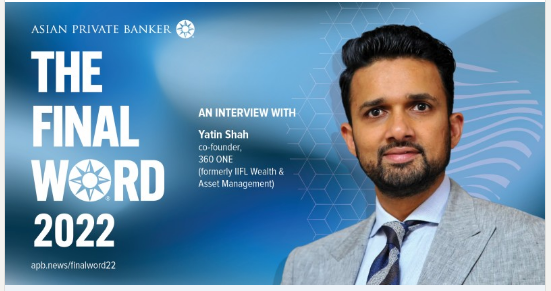
Asian Private Banker’s Final Word 2022 feature collects the insights and views of private banking and wealth management leaders from across the regional industry. Yatin Shah, co-founder, 360 ONE (earlier IIFL Wealth & Asset Management) shares his views on AUM protection, client retention, 2023 key investment themes, and more with Asian Private Banker's editorial team.
The last 12 months have undeniably been volatile for private banks. How have you navigated these headwinds in order to protect AUM and revenue, attract net new assets and maintain the client base?
We have always strongly emphasised on the need to develop a customised asset allocation strategy and adhere to it during market ups and down. This strategy is imbued in an Investment Policy Statement (IPS), which is basically a written policy statement that outlines the unique risk/return profile of our clients and captures the asset allocation strategy especially curated for them. This IPS helps to ensure that during volatile times, there is no deviation from the stated plan. As a matter of fact, despite the prevailing volatility, we have been able to add value accretive assets to our portfolios.
Global markets this year have been rocked by decades-high inflation, rising interest rates and a plethora of geopolitical challenges ranging from Russia’s invasion of Ukraine to fresh tensions between Washington and Beijing. What will be the key investment themes for the market in 2023? How are you advising clients to invest in the region of Asia Pacific?
In the backdrop of the prevailing landscape, India’s resilience, both from the perspective of economic stability as well as stock market performance, has been of note. As various factors ranging from regulation and policy to business environment align for India, we can expect the country to create multiple opportunities for investment growth. Thus, we firmly believe that India is a decadal investment opportunity for investors looking to gain exposure to the Asia Pacific region. At the same time, at least in the near-term, inflation is likely to remain on the higher side. From that perspective, real assets like InVITs and REITs, where value goes up with inflation, will continue to do well. Further, fixed-income yields are on the higher side and offer an opportunity to lock-in higher yielding assets. Credit demand is high and the environment is fair for investments in credit with adequate safeguards. Gold-related investments can form around 5% of the overall portfolio as a means of currency protection. We have an underweight stance on equity and we suggest cash available can be deployed in a staggered manner over 3 months. Within equity, we suggest ~30% allocation in mid-caps. Around 15% can be invested in international equity.
In 2022, China’s economy has been challenged by ongoing COVID 19 restrictions and a weaker real estate market. How are you helping your clients to mitigate the investment risks in the world’s second largest economy?
Our clients are focused on India and thus the growth and potential in India is our key focus. However, if we were to discuss the potential in India vis-à-vis China, our general thought is that currently India is well-positioned to play a larger role on the global stage, especially in the case of trade. Due to ongoing political tensions and the need to diversify supply chains, many countries across the world are actively looking to adopt a China plus strategy with an aim to de-risk their supply chains and trade function. India will inevitably be a beneficiary of this activity.
COVID-19 was an accelerant in terms of investments in digitalisation in the private banking industry. But with the pandemic finally receding in Asia-Pacific, how do private banks best combine technology with a high-touch, face-to-face service going forward, both in terms of clients and RMs? What will be the focus for tech investments in 2023?
Even before the onset of the pandemic, digitisation was gaining traction across industries. The pandemic only served to accelerate its adoption. Today, technology solutions are being increasingly embraced by financial companies. However, in this rapid race to digitsation, it is important to understand that financial services, especially wealth management, requires human interface and personalisation. Thus, the future for financial services is really ‘Phygital’. Technology should be leveraged for specific functions like operations, for more efficient service delivery, and for cutting-edge portfolio and performance analytics. However, decision- making may continue to primarily be face to face with the relationship manager.
ESG and sustainability are generally higher up the agenda than ever for private clients in the region. However, many ESG-focused funds and products have struggled this year amid market volatility and a surge in prices for traditional fossil fuels. How do private banks continue to generate interest in ESG-related investments against this backdrop?
Inarguably, ESG as a theme is gaining traction among institutional as well as high net worth investors. At a broader level, we are finding that the demand for responsible investing is being driven not only by expectation of higher returns. As investors and public at large is getting sensitised to the sustainability needs of the planet, they are more conscious about whether their wealth is part of the problem or the solution. Having said that, while this year’s geopolitical events have caused a resurgence of traditional fossil fuels, the long-term trajectory for humanity has to be towards cleaner energy sources. For a long-term oriented investor, a brief hiccup should not really affect interest in ESG-related investments.
We continue to look for the right talent to help us build our current and new business lines and expand our geographical growth in Tier I and Tier II Indian cities. We are also enhancing our digital and automation capabilities to champion future business growth and here we are adding more talent. In 2023, a focused and structured approach will be adopted for university programs. The aim is to introduce psychometric based assessment tools to hire from university programs and laterals. In addition, our focus is on reskilling and up skilling our existing employees, through structured learning journeys. Furthermore, to add while assessing the talent we are focusing on track records, functional capabilities and potential. Importantly, we will look for talent who can live our values every day, which include our work ethos of being client-centric, entrepreneurial, right in letter & spirit, change champion, people-orientated, rigorous and risk conscious.

Read the original article:
Asian Private Banker
